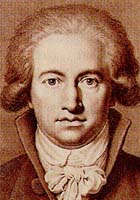From Faust - I. Dedication Poem by Johann Wolfgang von Goethe
From Faust - I. Dedication
YE shadowy forms, again ye're drawing near,
So wont of yore to meet my troubled gaze!
Were it in vain to seek to keep you here?
Loves still my heart that dream of olden days?
Oh, come then! and in pristine force appear,
Parting the vapor mist that round me plays!
My bosom finds its youthful strength again,
Feeling the magic breeze that marks your train.
Ye bring the forms of happy days of yore,
And many a shadow loved attends you too;
Like some old lay, whose dream was well nigh o'er,
First-love appears again, and friendship true;
Upon life's labyrinthine path once more
Is heard the sigh, and grief revives anew;
The friends are told, who, in their hour of pride,
Deceived by fortune, vanish'd from my side.
No longer do they hear my plaintive song,
The souls to whom I sang in life's young day;
Scatter'd for ever now the friendly throng,
And mute, alas! each sweet responsive lay.
My strains but to the careless crowd belong,
Their smiles but sorrow to my heart convey;
And all who heard my numbers erst with gladness,
If living yet, roam o'er the earth in sadness.
Long buried yearnings in my breast arise,
Yon calm and solemn spirit-realm to gain;
Like the AEONIAN harp's sweet melodies,
My murmuring song breathes forth its changeful strain.
A trembling seizes me, tears fill mine eyes,
And softer grows my rugged heart amain.
All I possess far distant seems to be,
The vanish'd only seems reality.
This poem has not been translated into any other language yet.
I would like to translate this poem
The world according to urchins.... Never been a fan of modern poetry where words are often used only for their auditorial aesthetic value and not their meanings.... As in real life beauty never replaces substance. Not when something really matters, really counts. The literal translation of the words in this poem - as I understand them - is that urchins are reporting that there are children - bound by ropes (cordage) - and resting on the bottom of the sea. Where they are obviously dead. Was that Crane's intention? With modern poetry - who knows? His intention might have simply been 'wow, these words look really cool next to one another.'